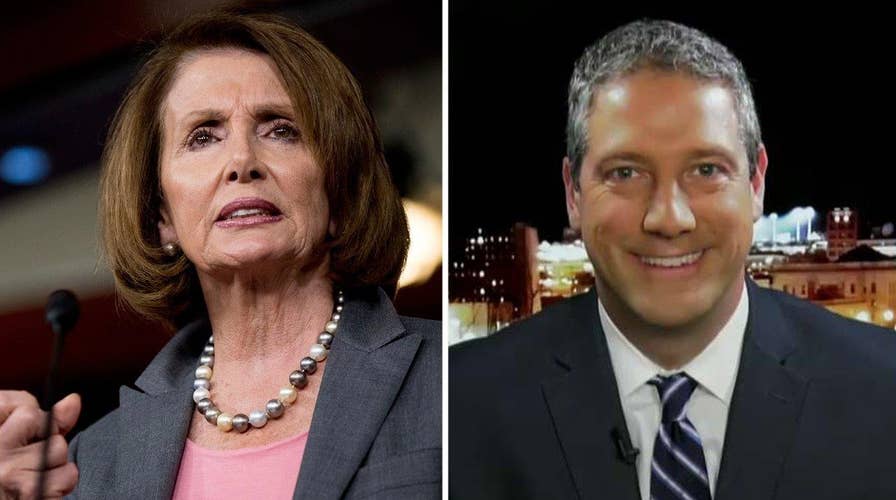Rep. Tim Ryan speaks out about challenging Pelosi
On 'The Kelly File,' Ohio congressman sounds off about running for House minority leader
Democrats are already moving past their November losses to revamp for a 2018 comeback but so far appear to be sticking closely to a familiar playbook -- re-electing the same leaders and trying to woo minority voters.
Just days after House Democrats voted to extend California Rep. Nancy Pelosi’s long reign atop their caucus, the Democratic Congressional Campaign Committee gave New Mexico Rep. Ben Ray Luján a second term as chairman.
The DCCC also announced a new, more diverse set of senior staffers, following public exchanges about controlling Democratic leaders and members not paying their dues.
But the group has yet to outline the kind of economic message that many rank-and-file Democrats think will be necessary to attract younger voters and reconnect with the working-class Midwesterners who helped Donald Trump win the White House and his Republican Party keep its House and Senate majority.
Ohio Rep. Tim Ryan, who last month challenged Pelosi for the post of Democratic House leader, made the economy a centerpiece of his bid and continued to hit that message after his loss.
“We need to talk about economics … jobs, pensions, wages,” he said. “We got off that message. … We can’t keep going down the same road.”
However, House members, particularly the handful who backed Ryan’s attempted coup, appear to have halted their public criticism, in part because Pelosi agreed to hold a vote for DCCC chairman, instead of leadership handpicking one.
DCCC spokeswoman Meredith Kelly on Tuesday acknowledged the group's need for a clearer jobs message but also argued House Democrats had a good election cycle considering the tough environment for her party, gaining six seats and losing only one incumbent race.
“It is critical that Democrats better convey our economic message, so that working families from upstate New York to Colorado and Florida know which party truly has their back,” she said.
Republican strategist David Payne suggests Democrats do not see November as a cause for serious introspection.
“When a party loses big, they change big,” Payne, a partner at Vox Global, said Tuesday. “Their 2016 loss doesn’t strike most Democrats as a major loss. They look at Clinton’s win in the popular vote and loss in the Electoral College as a small loss, overall.”
But he said Democrats “need to be developing a unified message to the nation -- one focused on jobs and economic vitality.”
The Democratic Senatorial Campaign Committee, charged with electing and reelecting members in the chamber, is also going with a party stalwart in the top slot. It will be led by incoming Maryland Democratic Sen. Chris Van Hollen, who ran the DCCC for four years while serving seven terms in the House.
Incoming Senate Majority Leader Chuck Schumer, D-N.Y., said Van Hollen was the caucus’ “first choice,” in having to defend 25 Democratic senators seeking reelection in 2018.
Van Hollen already is looking for an executive director. And among those being considered are Addisu Demissie, a former Hillary Clinton campaign director, and Paul Tencher, who ran Democrat Evan Bayh's failed effort this year to win a Senate seat in Indiana, according to Politico.
The front-runner in the race to lead the Democratic National Committee, meanwhile, is liberal Minnesota Rep. Keith Ellison, the first Muslim elected to Congress. Labor Secretary Tom Perez reportedly is planning to mount a bid for the DNC position, amid criticism about Ellison’s past comments about Israel and his support for Nation of Islam leader Louis Farrakhan.













































